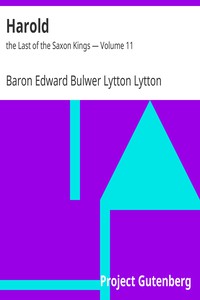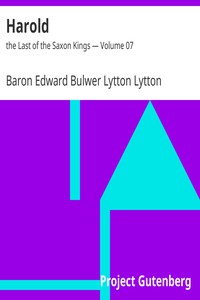Harold : the Last of the Saxon Kings — Complete by Lytton (good books for 8th graders .TXT) 📗

- Author: Lytton
Book online «Harold : the Last of the Saxon Kings — Complete by Lytton (good books for 8th graders .TXT) 📗». Author Lytton
The Queen paced slowly, but in evident agitation, to and fro the room, and her hands clasped convulsively the rosary round her neck; then, after a pause of thought, she motioned to Edith and, pointing to the oratory, said with forced composure, “Enter there, and there kneel; commune with thyself, and be still. Ask for a sign from above—pray for the grace within. Go; I would speak alone with Harold.”
Edith crossed her arms on her bosom meekly, and passed into the oratory. The Queen watched her for a few moments tenderly, as the slight, child-like form bent before the sacred symbol. Then she closed the door gently, and coming with a quick step to Harold, said, in a low but clear voice, “Dost thou love the maiden?”
“Sister,” answered the Earl sadly, “I love her as a man should love woman—more than my life, but less than the ends life lives for.”
“Oh, world, world, world!” cried the Queen, passionately, “not even to thine own objects art thou true. O world! O world! thou desirest happiness below, and at every turn, with every vanity, thou tramplest happiness under foot! Yes, yes; they said to me, ‘For the sake of our greatness, thou shalt wed King Edward.’ And I live in the eyes that loathe me—and—and——” The Queen, as if conscience-stricken, paused aghast, kissed devoutly the relic suspended to her rosary, and continued, with such calmness that it seemed as if two women were blent in one, so startling was the contrast. “And I have had my reward, but not from the world! Even so, Harold the Earl, and Earl’s son, thou lovest yon fair child, and she thee; and ye might be happy, if happiness were earth’s end; but, though high-born, and of fair temporal possessions, she brings thee not lands broad enough for her dowry, nor troops of kindred to swell thy lithsmen, and she is not a markstone in thy march to ambition; and so thou lovest her as man loves woman—‘less than the ends life lives for!’”
“Sister,” said Harold, “thou speakest as I love to hear thee speak—as my bright-eyed, rose-lipped sister spoke in the days of old; thou speakest as a woman with warm heart, and not as the mummy in the stiff cerements of priestly form; and if thou art with me, and thou wilt give me countenance, I will marry thy godchild, and save her alike from the dire superstitions of Hilda, and the grave of the abhorrent convent.”
“But my father—my father!” cried the Queen, “who ever bended that soul of steel?”
“It is not my father I fear; it is thee and thy monks. Forgettest thou that Edith and I are within the six banned degrees of the Church?”
“True, most true,” said the Queen, with a look of great terror; “I had forgotten. Avaunt, the very thought! Pray—fast—banish it—my poor, poor brother!” and she kissed his brow.
“So, there fades the woman, and the mummy speaks again!” said Harold, bitterly. “Be it so: I bow to my doom. Well, there may be a time when Nature on the throne of England shall prevail over Priestcraft; and, in guerdon for all my services, I will then ask a King who hath blood in his veins to win me the Pope’s pardon and benison. Leave me that hope, my sister, and leave thy godchild on the shores of the living world.”
The Queen made no answer, and Harold, auguring ill from her silence, moved on and opened the door of the oratory. But the image that there met him, that figure still kneeling, those eyes, so earnest in the tears that streamed from them fast and unheeded, fixed on the holy rood—awed his step and checked his voice. Nor till the girl had risen, did he break silence; then he said, gently, “My sister will press thee no more, Edith——”
“I say not that!” exclaimed the Queen.
“Or if she doth, remember thy plighted promise under the wide cope of blue heaven, the old nor least holy temple of our common Father.”
With these words he left the room.
CHAPTER VII.
Harold passed into the Queen’s ante-chamber. Here the attendance was small and select compared with the crowds which we shall see presently in the ante-room to the King’s closet; for here came chiefly the more learned ecclesiastics, attracted instinctively by the Queen’s own mental culture, and few indeed were they at that day (perhaps the most illiterate known in England since the death of Alfred 117); and here came not the tribe of impostors, and the relic-venders, whom the infantine simplicity and lavish waste of the Confessor attracted. Some four or five priests and monks, some lonely widow, some orphan child, humble worth, or protected sorrow, made the noiseless levee of the sweet, sad Queen.
The groups turned, with patient eyes, towards the Earl as he emerged from that chamber, which it was rare indeed to quit unconsoled, and marvelled at the flush in his cheek; and the disquiet on his brow; but Harold was dear to the clients of his sister; for, despite his supposed indifference to the mere priestly virtues (if virtues we call them) of the decrepit time, his intellect was respected by yon learned ecclesiastics; and his character, as the foe of all injustice, and the fosterer of all that were desolate, was known to yon pale-eyed widow and yon trembling orphan.
In the atmosphere of that quiet assembly, the Earl seemed to recover his kindly temperament, and he paused to address a friendly or a soothing word to each; so that when he vanished, the hearts there felt more light; and the silence hushed before his entrance, was broken by many whispers in praise of the good Earl.
Descending a staircase without the walls—as even in royal halls the principal staircases were then—Harold gained a wide court, in which loitered several house-carles 118 and attendants, whether of the King or the visitors; and, reaching the entrance of the palace, took his way towards the King’s rooms, which lay near, and round, what is now called “The Painted Chamber,” then used as a bedroom by Edward on state occasions.
And now he entered the ante-chamber of his royal brother-in-law. Crowded it was, but rather seemed it the hall of a convent than the ante-room of a king. Monks, pilgrims, priests, met his eye in every nook; and not there did the Earl pause to practise the arts of popular favour. Passing erect through the midst, he beckoned forth the officer, in attendance at the extreme end, who, after an interchange of whispers, ushered him into the royal presence. The monks and the priests, gazing towards the door which had closed on his stately form, said to each other:
“The King’s Norman favourites at least honoured the Church.”
“That is true,” said an abbot; “and an it were not for two things, I should love the Norman better than the Saxon.”
“What are they, my father?” asked an aspiring young monk.
“Inprinis,”





Comments (0)